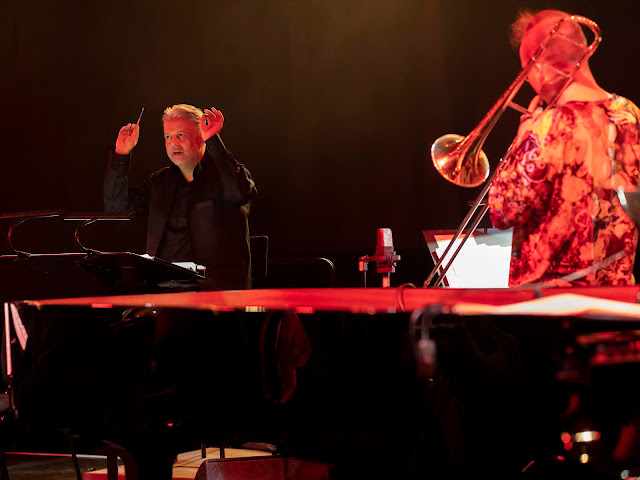 |
| Changing Standards - Lauren Kinsella, Trish Clowes, London Sinfonietta, Gerry Cornelius at Purcell Room |
Changing Standards: Trish Clowes, Elliot Galvin, Lara Jurd, Robert Mitchell, Alex Paxton - London Sinfonietta, dir: Gerry Cornelius; EFG London Jazz Festival at Purcell Room
Reviewed by Florence Anna Maunders, 18 November 2022
Dramatic reinterpretations of jazz standards by five young composer/performers as part of the EFG London Jazz Festival
There is an ever-closer alignment between the sonic worlds of contemporary jazz and other genres of contemporary music, and this project by the London Sinfonietta, Changing Standards at the Purcell Room (18 November 2022) as part of the EFG London Jazz Festival, involved commissioning five jazz composer/performers - Trish Clowes (saxophone), Elliot Galvin (piano, pictured above at the 2021 EFG London Jazz Festival), Lara Jurd (trumpet), Robert Mitchell (piano) and Alex Paxton (trombone) - to re-imagine and to be inspired by their favourite jazz standards, and to create and compose a new piece for themselves to perform with the ensemble, augmented for the occasion with the additions of vocalist Lauren Kinsella, bassist Will Sach and drummer Saleem Raman, conducted by Gerry Cornelius.

Changing Standards - Gerry Cornelius, Alex Paxton, London Sinfonietta, Gerry Cornelius at Purcell Room
This very well-attended concert featured some of the most interesting and varied figures in the contemporary UK jazz scene, and the musical results reflected this diversity of approach.
Firstly, saxophonist Trish Clowes presented her reworking of the Sammy Fain standard I'll Be Seeing You in which her keen compositional mind deconstructed the original melody and lyrics into small fragments, which she then reassembled into new and fascinating structures. Beginning with a dramatic solo introduction in which she gradually transitioned from air sounds into free-flowing post-bop lines, this built into a lyrical showpiece for the whole ensemble.
Elliot Galvin reworked Billie Holiday and Arthur Herzog's God Bless The Child, beginning sat at the piano with an extended solo. Forceful, dissonant, polyrhythmic and uncompromising, his compositional technique and individual performance style blended echoes of Ligeti and Monk into a fierce and sustained groove with hardly a moment to breathe.
With lush, chromatic, extended harmonies, pianist Robert Mitchell's piece Multitudes II seemed almost to be suspended in the air. Written as a response to George Russell's Stratusfunk, this music hovered beautifully in a timeless void, before settling into a gentle treading pace, after which, with radiant tenderness, eventually dissolving into a calm conclusion.
Laura Jurd's direct and lyrical trumpet playing was at the fore in her reimagining of Billy Strayhorn's A Flower is a Lovesome Thing, building progressively through stops and starts into a joyful, lolloping groove. The climax of the piece was an engaging and energised duet between her and vocalist Lauren Kinsella – a friendly competition and collaboration at the same time.
Bringing this programme to a close, the brilliantly bonkers composer Alex Paxton took to the stage, launching directly into an outrageously virtuosic (and extremely loud) duet with himself as vocalist and trombonist as an introduction to Meanie – a total reinvention of Thelonius Monk's I Mean You. This was eight minutes or so of total musical pandemonium, filled with lightning-fast changes, bizarre juxtapositions, polystylisic mayhem and a huge helping of sheer musical joy.
On the basis of this concert, it seems fair to claim that if the future of British jazz composition is in the hands of composer/performers like these five musicians, then we have a lot of very interesting evenings ahead. The combination of improvising jazz-vocabulary-speaking musicians with the conducted and notated music of the Sinfonietta players was seamless throughout the evening – this was much more than a “crossover gig” but musicians genuinely bringing together two adjacent musical traditions to create something new and ferociously exciting.
Reviewed by Florence Anna Maunders
Never miss out on future posts by following us
The blog is free, but I'd be delighted if you were to show your appreciation by buying me a coffee.
Elsewhere on this blog
- Music for French Kings: Amanda Babington introduces us to the fascinating sound-world of the musette in French Baroque music - cd review
- 2117/Hedd Wyn: Stephen McNeff & Gruff Rhys' Welsh language opera celebrating the Welsh poet - record review
- The sad clown and the ingenue: Jo Davies' 1950s-set production of The Yeomen of the Guard from English National Opera - opera review
- Young artists from Britten Pears Arts and Royal Opera impress in Britten's The Rape of Lucretia -opera review
- What it means to perform Turangalila: pianist William Bracken shares his thoughts on Messiaen's Turangalila Symphonie in advance of performing it- feature
- Massive climaxes & mystical moments: Vaughan Williams' A Sea Symphony is the centrepiece of The Bach Choir's celebration at the Royal Festival Hall - concert review
- Unnervingly different: Icelandic experimental composer Guðmundur Steinn Gunnarsson's Landvættirnar fjórar - record review
- English music with a French accent: Ensemble Correspondances and Sébastien Daucé in Matthew Locke's Psyche - record review
- The friendship of Hector Berlioz and Théophile Gautier in song at the London Song Festival - concert review
- Any successful society has music at its core: pianist Iyad Sughayer on his new music academy in Jordan - interview
- Superb musical performances and theatrical dazzle do not quite add up to a satisfying staging of Handel's Alcina at Covent Garden - opera review
- Finally getting the recording it deserves: Meyerbeer's first French opera, Robert le Diable, from Marc Minkowsky, Palazetto Bru Zane and Bordeaux Opera - record review
- Home











No comments:
Post a Comment